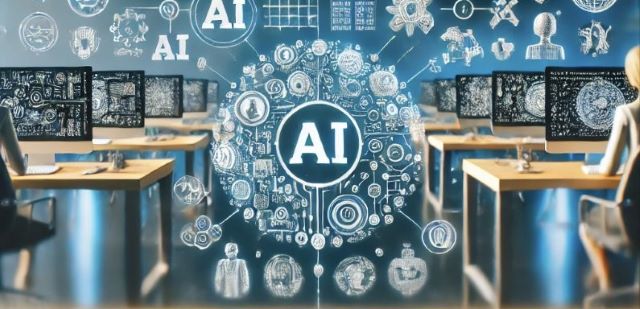
Historically, academic researchers have made remarkable contributions to artificial intelligence (AI) and can continue that legacy with fresh support.
In a promising move, the U.S. National Science Foundation (NSF) has teamed up with Nvidia to empower American scientists with enhanced AI capabilities. This collaboration is designed to stimulate discovery and strengthen U.S. leadership in AI innovation.
Together, they are paving the way for a groundbreaking approach to AI-driven scientific exploration, ensuring rigorous and trustworthy research while fostering an innovation ecosystem that enriches the lives of all Americans.
The field of artificial intelligence (AI) is evolving at an exciting pace. While developing advanced AI technologies can be costly, leading to some challenges for university labs and federally funded researchers, this situation also opens up new opportunities.
In July 2020, the University of Florida announced a $70 million artificial intelligence partnership with NVIDIA.
More recently, NVIDIA shared a customer success story that highlights efforts to close the educational gap between universities with robust resources and those without.
According to the report, the University of Florida’s AI steering committee invited each of its 16 colleges to collaboratively plan and fund artificial intelligence (AI) initiatives across the university.
The University of Florida became the first institution in the country to introduce AI curricula across various disciplines, offering elective courses such as AI in Agricultural and Life Sciences, AI in the Business Environment, and AI in Media and Society.
Additionally, the university launched a new nine-credit AI certificate program for undergraduates.
To extend AI knowledge beyond its campuses, the University of Florida also introduced a micro-credential program designed for working professionals, providing training and digital certificates to enhance in-demand AI skills, knowledge, and experience.
The university plans to hire an additional 100 AI-focused faculty members to expand AI course offerings beyond STEM majors. It has welcomed creative professionals to lead research in AI at its schools of music, theater, dance, art, and history.
In emerging economies like Colombia, the World Economic Forum reports that 2.8 million young people are unemployed.
Raquel Bernal, the rector of the University of Los Andes in Bogotá, Colombia, suggests that AI could make higher education more accessible.
She emphasizes that the alternative—having nearly three million young people without hope—is not viable.
Bernal views AI as a potential collaborator and tool for fostering personalized education for many young individuals who lack access to high-quality educational resources across the learning continuum.
During the World Economic Forum’s Age of Generative AI segment, Bernal shared insights on how generative AI is influencing the workforce and how universities can equip students for an ever-changing future. She identified three key areas of focus:
Digital Literacy: Everyone must understand modern technologies, including their potential applications and limitations. This understanding is especially vital for educators who will integrate AI into their teaching.
Digital Mindset: With disruptive technologies evolving rapidly, cultivating an agile approach to collaboration and continuous experimentation is essential. This mindset also involves leveraging intelligent data for decision-making.
Human-Centric Skills: As AI continues to advance, there is a pressing need to strengthen distinctly human qualities to complement AI rather than be replaced by it. Skills in the arts, humanities, and social sciences, such as ethics, creativity, critical thinking, curiosity, and navigating ethical dilemmas, are more important than ever.
Bernal expresses concern about the decline of these fields, asserting that they are essential in understanding humanity’s role in an AI-driven world.
Students in the arts and humanities should view AI not as a competitor but as a collaborator. Bernal believes that AI has the potential to enhance human capabilities.
By leveraging AI, she has discovered a more creative perspective towards problem-solving and encourages others to approach challenges from fresh angles.
We're partnering with the @NSF to accelerate scientific discovery.
Together, we’re supporting @allen_ai's OMAI initiative, building an open multimodal #AI ecosystem and empowering the next generation of researchers to advance U.S. leadership in science and engineering.
Read… pic.twitter.com/o6itH7LAhH
— NVIDIA AI (@NVIDIAAI) August 14, 2025
University of Florida announces $70 million artificial intelligence partnership with @NVIDIAhttps://t.co/xwfWpRaWu4 pic.twitter.com/ilG8W83PxV
— FLORIDA (@UF) July 21, 2020
En este nuevo episodio de Tres Respuestas conversé con Raquel Bernal, rectora de @Uniandes, sobre educación inicial, pertinencia rural, inteligencia artificial y aprendizaje a lo largo de la vida. Una mirada profunda sobre cómo la educación puede cerrar brechas y transformar el… pic.twitter.com/mXDVvDEcZD
— Iván Duque 🇨🇴 (@IvanDuque) June 18, 2025
The U.S. Army Corps of Engineers has been tasked with…
Brown and Caldwell, a leading environmental engineering and construction firm,…
Humboldt State University, one of four campuses within the California…